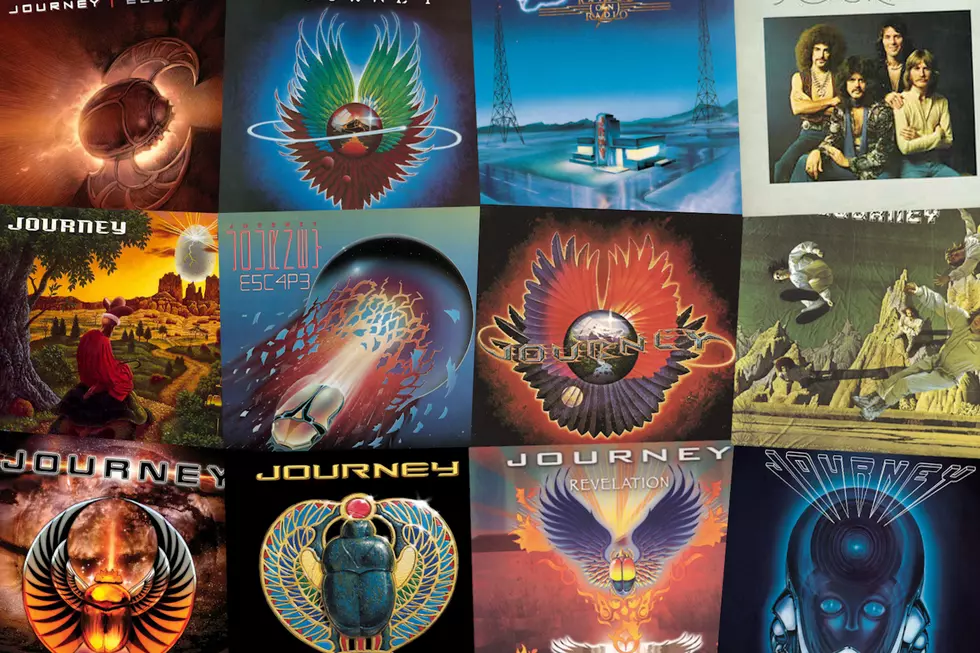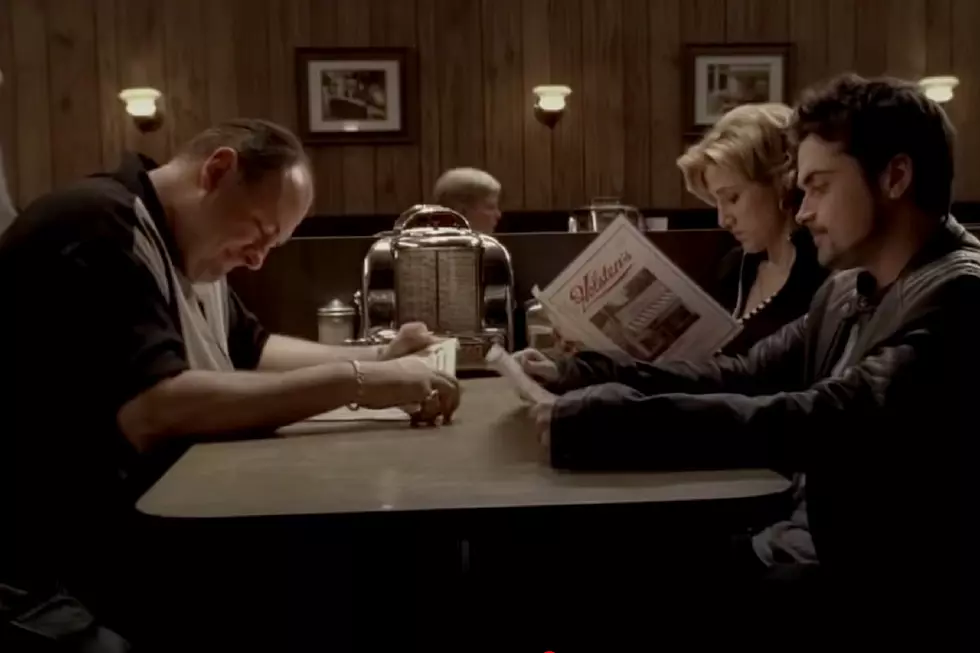
Underrated Journey: The Most Overlooked Song From Each Album
Journey scored so many ubiquitous hits, it's easy to forget they wrote anything else. But there's much more to the band than arena-packing power ballads like "Don't Stop Believin'" and "Open Arms."
Some classic rock fans may have never heard Journey's proggy Mach I lineup, which specialized in sprawling instrumentals flavored with dollops of jazz-fusion. Meanwhile, the "best of" crowd probably stopped listening after the 1998 exit of singer Steve Perry, whose soaring melodies defined their commercial peak. But there are obscure gems in every corner of the Journey catalog.
For the following list, we combed through the deep cuts of all 14 studio albums (excluding the 1980 soundtrack Dream, After Dream, which is so obscure, it's impossible to highlight one particular song). We wound up with a wide-ranging mixtape that samples everything this band does well: from karaoke-friendly weepiness to virtuoso showmanship.
"In My Lonely Feeling / Conversations"
From: Journey (1975)
Amazingly, 80 percent of the group that recorded "Lights" and "Wheel in the Sky" was present on Journey's proggy debut LP. It's hard to consider any of this material "underrated" when few FM rock fans know it exists. But some tracks have earned more love than others — UCR highlighted "ferocious workouts" "Of a Lifetime" and "Kahoutek," along with the bluesy "Topaz" and closer "Mystery Mountain." For our purposes, let's go with the two-part slow-burn "In My Lonely Feeling / Conversations." The first section sounds like a bluesier version of early '70s Pink Floyd, with keyboardist Gregg Rolie belting in full voice over his own heavy organ. It flows seamlessly into the back half, built on Neal Schon's trickling-waterfall guitar licks.
"Look Into the Future"
From: Look Into the Future (1976)
Journey started to meld their prog and pop-rock sides on their second album — but they were still miles away from, say, "Who's Crying Now," and the band's strength still lied in raw musicianship over verse-chorus songwriting. The eight-minute title track is a lost classic: a spacey, expansive ballad that peaks with Schon in full guitar hero mode.
"Nickel and Dime"
From: Next (1977)
That ratio of flashiness and catchiness remained on Next. Lighter, tighter tracks like "Spaceman" showcased Rolie's soulful side without sacrificing musical flair — but mostly, these dudes just wanted to crank up and play. And who could blame them? As an instrumental, "Nickel and Dime" naturally gets overlooked. But it's one of the early band's most confident pieces, rivaling Mahavishnu Orchestra in dizzying jazz-fusion interplay: Schon's guitar hits overdrive here, seemingly inspired by John McLaughlin's aggressive flights of fancy.
"Patiently"
From: Infinity (1978)
Yeah, yeah, we know: This anthemic hard rock power ballad does appear on Journey's second greatest hits LP. But it wasn't even issued as a single, and they've only played it live on 45 occasions. (Good on them, though, for dusting it off three times in 2015.) The song, co-written by Schon and new golden-voiced frontman Perry, is every bit the equal of Infinity hits "Lights" and "Wheel in the Sky" — splitting the difference between "Dust in the Wind" and "Free Bird."
"Daydream"
From: Evolution (1979)
The pop songs rightly get most of the glory on Evolution, with Roy Thomas Baker adding his signature slick production to "Lovin', Touchin', Squeezin'" and "Just the Same Way." But the deep cuts, particularly the penultimate semi-epic "Daydream," prove they could still stretch out if allowed enough space. This one's delightfully loopy: the chimes, the abundance of gurgling synth, the almost Allman-y acoustic twang, lyrics about "crystal ships" sailing to sea. But the song climaxes in a stadium-tailored expanse, with Schon's guitar and Perry's voice crying in unison.
"Someday Soon"
From: Departure (1980)
Less than a year after Evolution, Journey chiseled out another slab of polished pop-rock with Departure, led by the No. 23 Billboard hit "Any Way You Want It." The album tends to be overlooked outside of that hit, especially since it only predates their true blockbuster LP by one year. "Someday Soon" has especially suffered — Allmusic even called it "filler." But we disagree: Gregg Rolie delivers his final co-lead vocal here, his huskier tone contrasting with Perry's over a fidgety Schon riff.
"Escape"
From: Escape (1981)
On a multi-platinum album where half the songs are hits ("Don't Stop Believin'", "Who's Crying Now," "Open Arms," "Still They Ride," "Stone in Love"), there aren't many gems to stay hidden. But the title track is the most interesting of the non-singles, pairing a first-pumping chorus with a boatload of nifty touches: laser-beam synths, flashy guitar harmonics, stacked vocal harmonies and eyebrow-raising chord changes.
"Frontiers"
From: Frontiers (1983)
Journey were in cruise-control on Frontiers, churning out another quartet of power ballads and stadium rock staples: "Separate Ways (Worlds Apart)," "Faithfully," "After the Fall" and "Send Her My Love." (That's not including "Only the Young," recorded for Frontiers but shelved until 1985.) But Journey saved their most intriguing material for the second side, including the title track, with its frantic Perry vocal and tricky dynamic between Schon's guitar and Steve Smith's drums. (Come in at the wrong spot and you may have trouble finding the downbeat.)
"It Could Have Been You"
From: Raised on Radio (1986)
With Perry exerting even more influence than usual, serving as sole producer, Journey's ninth LP inevitably feels like their least band-like. (The sterile mix doesn't help.) There are bright spots: "It Could Have Been You" is a rare moment that actually sounds like a rock band doing rock band things. Perry taps into the scratchier, gruffer side of his voice, and Schon's squealing riff finds a simpatico companion in Randy Jackson's funky slap-bass.
"Can't Tame the Lion"
From: Trial by Fire (1996)
Technically "Can't Tame the Lion" was a single — and it even landed at No. 33 on Billboard's Mainstream Rock chart. But since no one outside the diehards even remembers this song, we're fine with calling it "underrated." Plus, it's a rare highlight on the mostly dicey Trial by Fire — anchored by Schon's rippling, palm-muted riffs and a vintage Perry-in-inspirational-mode melody.
"All the Things"
From: Arrival (2000)
Journey ventured back into riff-centric writing on Arrival, recruiting Steve Augeri to replace their exited vocal god. Fittingly, they sound like a new band — several tracks here are closer in spirit to alt-rock and grunge than the crowd-pleasing balladry of yore. One of the heaviest moments is "All the Things," with its Eastern-tinged guitars, Hammond organ and a dynamic Augeri vocal.
"Out of Harms Way"
From: Generations (2005)
Journey flirt with prog-metal on the thundering "Out of Harms Away." With Augeri's bombastic vocal, Schon's modern-sounding distortion and Deen Castronovo's enormous drums, the track calls to mind Dream Theater from the same era. They're pretty far removed from "When You Love a Woman," and they sound pretty jazzed about it.
"The Journey"
From: Revelation (2008)
It was their first record with Arnel Pineda, whose expressive timbre is eerily similar to Perry's. So Journey made the most of that shift, writing loads of power ballads and vintage-vibe rockers. But they closed Revelation with one blast from the way, way past, the instrumental Schon showcase "The Journey," full of bountiful melodic swoops and supreme vibrato. It feels like a virtuoso flashing his badge: "Don't forget — I can still do this stuff."
"Venus"
From: Eclipse (2011)
Journey's latest LP brought a welcome injection of prog and hard rock — their most out-there material since the days when Schon sported an afro. And, like last time, they saved the flashiest tune, "Venus," for an album-closing instrumental: With its effects-melted guitar solos, 7/8 time signature and volcanic drums, it sounds more like the Mars Volta than any of the bands Journey might share a bill with.
Journey Lineup Changes: A Complete Guide
More From KLTD-FM










